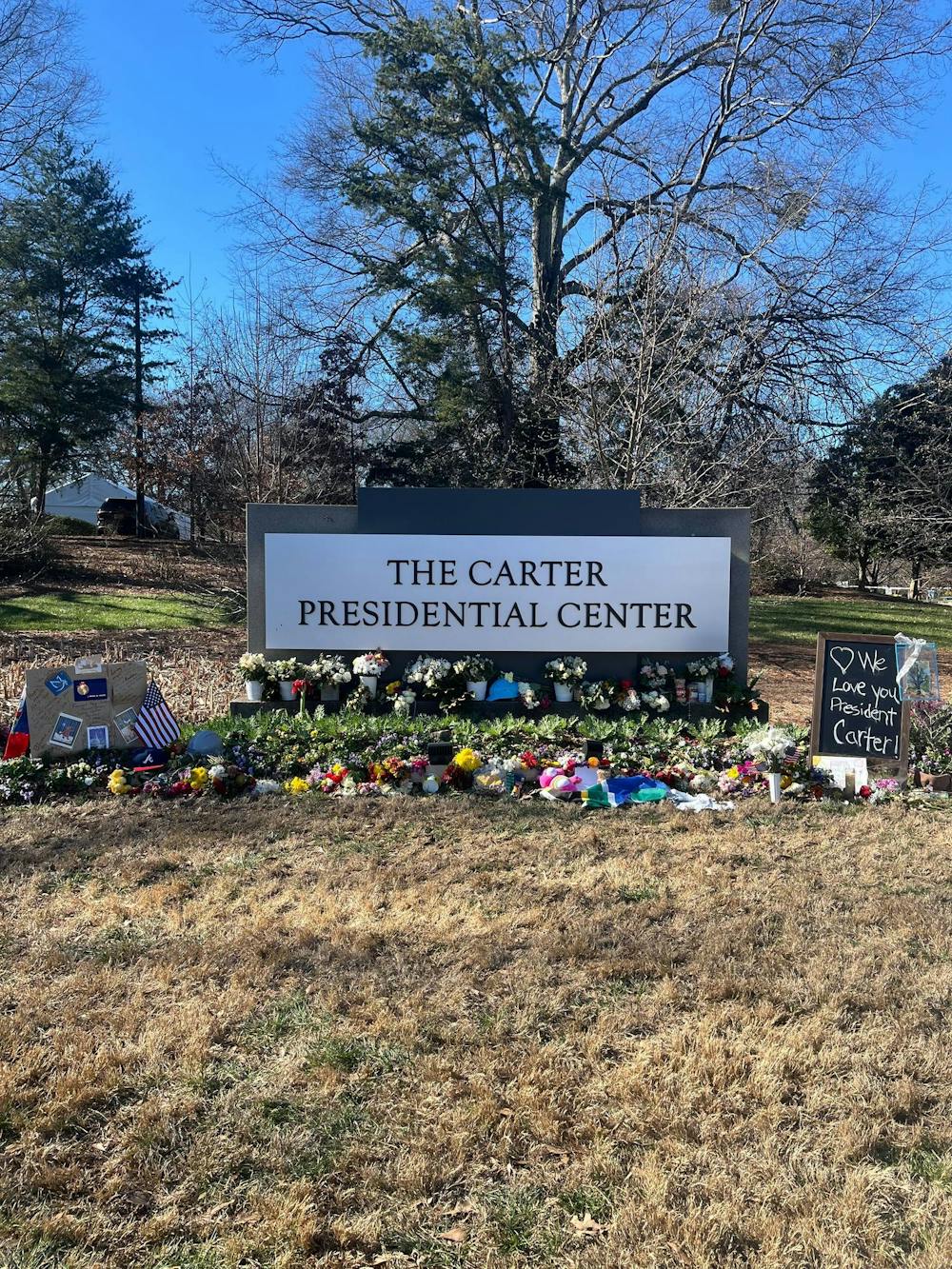As daylight turned to dusk on Jan. 4, hundreds of people braved frigid temperatures and gathered outside the Carter Center to honor the life of former U.S. President Jimmy Carter, who died on Dec. 29, 2024, at the age of 100.
Funeral services for the late president and former Georgia governor began in the morning, marking the start of a six-day journey that will end with a burial in his hometown of Plains, Ga. A motorcade started by departing from Phoebe Sumter Medical Center before transporting Carter’s body through Plains, stopping briefly at his childhood home and farm. The motorcade then carried Carter to Atlanta on Saturday.
Around 3 p.m. on Jan. 4, Gov. Brian Kemp (R-Ga.) and Atlanta Mayor Andre Dickens joined members of the Georgia General Assembly for a moment of silence at the Georgia State Capitol, where Carter served both as a state senator and as governor before ascending to the presidency.
Following the tribute, the motorcade arrived at the Carter Center. Military body bearers carried Carter’s remains through the Center’s Circle of Flags, all lowered to half-staff in observance of the late president’s death. Inside, a memorial service included remarks from Carter’s son and grandson.
“He was an amazing man, and he was held up and propped up and soothed by an amazing woman,” James Earl “Chip” Carter III, Carter’s son, said, referencing former First Lady Rosalynn Carter, who died in November 2023. “The two of them together changed the world, and it was an amazing thing to watch from so close and to be able to be involved in.”
A stream of mourners paid their respects to Carter throughout the day, leaving flowers at the Carter Center’s entrance sign. The Center opened its doors to the public around 7 p.m. Despite chilly winds, crowds — comprised of both locals and visitors — lined up almost two hours before the viewing time.
Individuals walked through the Jimmy Carter Presidential Library and Museum, surrounded by images and memorabilia from Carter’s lifetime, before greeting the flag-draped casket. A military honor guard kept watch as the public grieved the only Georgian to ever become president.
For Ellen Diamond (85C), the day felt deeply personal. She recalled her time as an undergraduate political science student at Emory University, when she had the chance to hear Carter lecture and lead a symposium alongside his friend and 38th U.S. President Gerald Ford. Carter joined Emory’s faculty as a university distinguished professor in 1982, before being granted tenure in 2019.
“The first day he showed up on campus, I was standing in front of the library … and he came walking with the Secret Service in the other direction,” Diamond said. “The New York Times was there. I wound up in a picture with Jimmy Carter coming to Emory in The New York Times, and he signed it for me.”
Diamond went on to volunteer for The Atlanta Project, a program that the Carter Center founded to tackle “complex problems” including the lack of affordable housing, low immunization rates, high teen pregnancy rates and high school dropout rates.
“I took a busload of inner-city kids somewhere out in Georgia to go fishing,” Diamond said. “I had to coordinate all this, the trip, and got picked up by the papers, and President Carter came into my little cubicle and thanked me.”
Silvia Trigoso, an emergency preparedness and response worker at the Centers for Disease Control and Prevention, echoed Diamond’s appreciation for Carter’s efforts in promoting human welfare. She first met Carter at a public health event when she moved to Atlanta 14 years ago.
“It's really his work post-presidency that he has done around global health, that always has really just inspired me,” Trigoso said. “Really tremendous work around global health in Africa to eliminate some diseases that we don't always hear about, but he was so passionate about it, and that has translated to me.”
Additionally, Trigoso spoke about Carter’s humble upbringing, hard work and perseverance.
“If you live to be 100, which is a luxury — I know that, working in public heath — you just want to kind of start your day every day just living by your values, and I think if you do that, you’ve lived an amazing life,” Trigoso said.
David Montoya said he traveled 15 hours from Austin, Texas to Georgia, not wanting to miss out on the chance to say goodbye to the late president. He visited Carter’s 1976 presidential campaign headquarters in Plains before arriving at the public repose.
Montoya shared one of his favorite stories about Carter, who planted an orchard of trees on his farm in the 1990s to encourage sustainability. At the age of 95, Carter cut down one of the trees and had the harvested wood crafted into a guitar.
Inspired by Carter’s example, Montoya carried an American flag on a wooden stick, waving the flag outside the Carter Center in the late president’s memory.
“If Jimmy Carter made a guitar out of a tree that fell, I can make a flag pole out of that,” Montoya said. “He’d probably get a kick out of that.”
Carter laid in repose at the Carter Center until 6 a.m. yesterday morning, when visitation for members of the public concluded. Around 10 a.m. yesterday, Carter departed for a final trip to Washington, D.C. Carter’s procession will then make its way back to Plains for a concluding private ceremony tomorrow.

Safa Wahidi (she/her) (23Ox, 26C) is from Sugar Hill, Georgia, and is double-majoring in political science and creative writing. Outside of the Wheel, Safa has worked at Spoon University, Forsyth County News and CNN International. Previously, Safa’s pop culture column “Wahidi’s What’s Happening” won first place nationally at the Society of Professional Journalists Mark of Excellence Awards. In her free time, you can find Safa exploring nearby bookstores and brunch spots.






